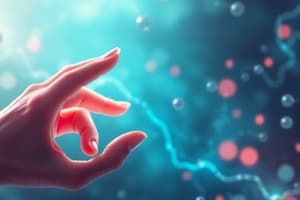Podcast
Questions and Answers
Which hormone is secreted by the pancreas to lower blood glucose levels?
Which hormone is secreted by the pancreas to lower blood glucose levels?
- Adrenaline
- Glucagon
- Insulin (correct)
- Oestrogen
The release of hormones from the pituitary gland is always triggered by the nervous system.
The release of hormones from the pituitary gland is always triggered by the nervous system.
False (B)
What is the primary function of hormones released by the pituitary gland?
What is the primary function of hormones released by the pituitary gland?
To regulate the release of other hormones
The hormone _____ released from the hypothalamus stimulates the pituitary gland to release follicle-stimulating hormone (FSH).
The hormone _____ released from the hypothalamus stimulates the pituitary gland to release follicle-stimulating hormone (FSH).
Match each type of hormone with its characteristic:
Match each type of hormone with its characteristic:
Which hormone is known for raising blood sugar levels?
Which hormone is known for raising blood sugar levels?
Steroid hormones are both hydrophilic and lipid soluble.
Steroid hormones are both hydrophilic and lipid soluble.
Name one function of insulin in the body.
Name one function of insulin in the body.
Hydrophilic hormones bind to __________ on the surface of target cells.
Hydrophilic hormones bind to __________ on the surface of target cells.
Match the hormones with their primary functions:
Match the hormones with their primary functions:
Which type of hormone usually produces fast responses in target cells?
Which type of hormone usually produces fast responses in target cells?
Non-steroid hormones can diffuse directly through the cell membrane.
Non-steroid hormones can diffuse directly through the cell membrane.
What is one characteristic of steroid hormones in relation to cell membranes?
What is one characteristic of steroid hormones in relation to cell membranes?
The __________ hormone complex enters the nucleus to initiate transcription of specific genes.
The __________ hormone complex enters the nucleus to initiate transcription of specific genes.
What type of hormone is made from cholesterol?
What type of hormone is made from cholesterol?
Peptide hormones can easily pass through the phospholipid bilayer of the cell membrane.
Peptide hormones can easily pass through the phospholipid bilayer of the cell membrane.
Name one example of a peptide hormone.
Name one example of a peptide hormone.
FSH promotes the development of ______ in women.
FSH promotes the development of ______ in women.
Match the hormone with its type:
Match the hormone with its type:
How do steroid hormones primarily affect cells?
How do steroid hormones primarily affect cells?
Epinephrine is a steroid hormone that affects the cardiovascular system.
Epinephrine is a steroid hormone that affects the cardiovascular system.
What is the role of the pituitary gland in the endocrine system?
What is the role of the pituitary gland in the endocrine system?
Flashcards are hidden until you start studying
Study Notes
Hormone Types and Structure
- Hormones can be classified as peptides, proteins, or steroids based on their structural properties.
- Peptides consist of short chains of amino acids (polypeptides).
- Proteins are longer chains of amino acids, often derived from tyrosine.
- Steroids are lipids derived from cholesterol and are lipid-soluble.
Hormone Mechanism of Action
- Peptide and protein hormones, which are polar, cannot diffuse across cell membranes and instead bind to surface receptors.
- Upon binding, they activate relay proteins inside the cell, initiating cascades that alter metabolism and gene expression.
- Steroid hormones diffuse through the cell membrane due to their lipid solubility, binding to internal receptors in the cytoplasm or nucleus.
- The receptor-hormone complex formed in steroid action enters the nucleus to affect transcription of specific genes.
Examples of Hormones
- Peptide Hormones:
- ADH (Antidiuretic Hormone): Manages water levels; acts in kidneys.
- Insulin: Lowers blood sugar; produced in the pancreas.
- Glucagon: Raises blood sugar; also produced in the pancreas.
- Protein Hormones:
- Epinephrine (Adrenaline): Produced in adrenal glands; involved in fight or flight response.
- Human Growth Hormone: Influences bone and muscle mass and decreases fat; secreted by anterior pituitary.
- Norepinephrine: Similar role to epinephrine, mainly acting on cardiovascular systems.
- FSH (Follicle-Stimulating Hormone): Promotes egg development in women and sperm in men; made in the anterior pituitary.
- Steroid Hormones:
- Oestrogen: Develops secondary sexual characteristics in females; produced in ovaries.
- Testosterone: Promotes development of male reproductive system.
Hormone Release Mechanisms
- Hormones can be released in response to signals from the nervous system or other hormones.
- Example: Insulin release is triggered by the nervous system's signals to the pancreas.
- Hypothalamus releases GnRH which stimulates the pituitary gland to release FSH, affecting ovarian hormone production.
Blood Glucose Regulation
- Blood glucose levels are tightly regulated to stay within a tolerance range.
- Specialized pancreatic cells detect deviations and secrete glucagon or insulin, which exert opposite effects on blood glucose levels.
Characteristics of Hormone Responses
- Peptide hormones produce rapid, short-term responses due to their water solubility and receptor action.
- Steroid hormones result in slower, long-term responses by altering gene expression through direct interaction with DNA.
Studying That Suits You
Use AI to generate personalized quizzes and flashcards to suit your learning preferences.



